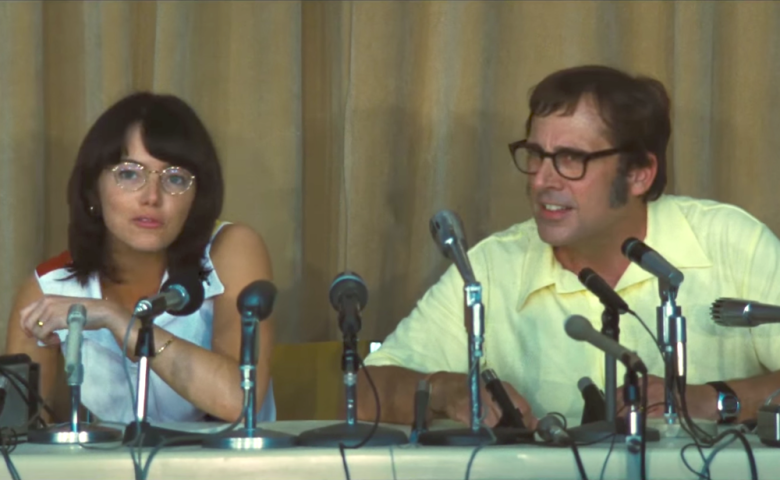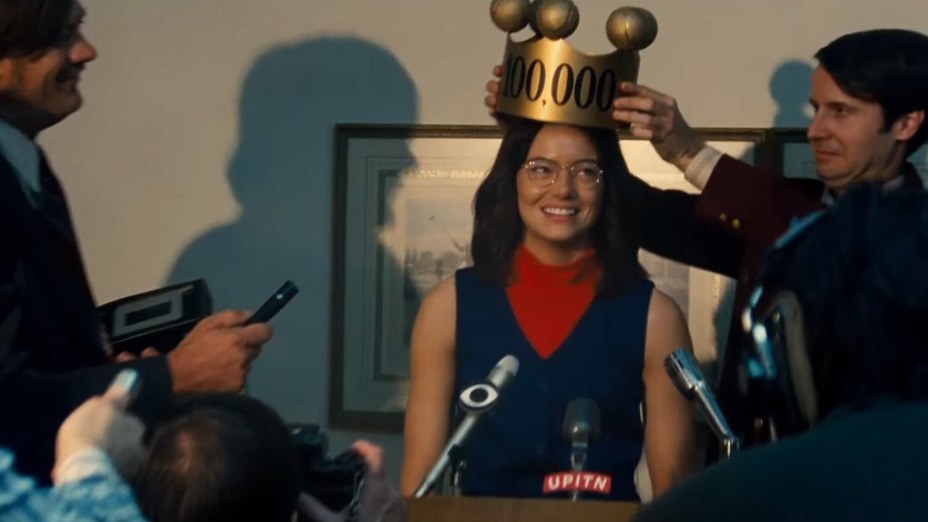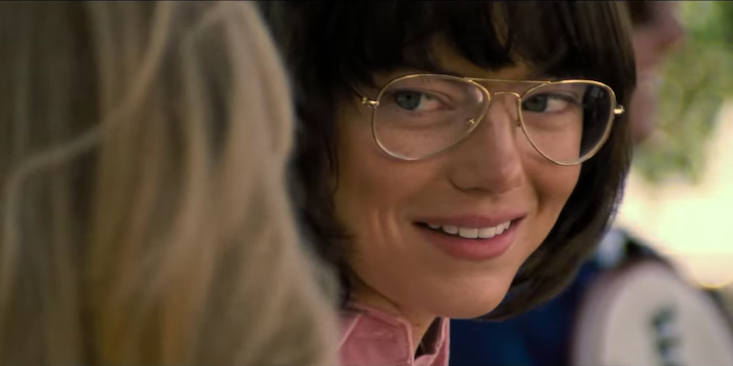Battle of the Sexes – Film Review
Reviewed by Damien Straker on the 5th of October 2017
Fox presents a film by Jonathan Dayton and Valerie Faris
Produced by Christian Colson, Danny Boyle and Robert Graf
Written by Simon Beaufoy
Starring Emma Stone, Steve Carell, Andrea Riseborough, Sarah Silverman, Bill Pullman, Alan Cumming, Elisabeth Shue, Austin Stowell and Eric Christian Olsen
Music by Nicholas Britell
Cinematography Linus Sandgren
Edited by Pamela Martin
Running Time: 121 minutes
Rating: PG
Release Date: the 28th of September 2017
Battle of the Sexes tells the acutely timed, crowd-pleasing story of Billie Jean King, the champion tennis player and women’s liberator. In 1973, she publicly combatted sexism and misogyny through a classic charity match that pitched her unconventionally against a male opponent, her archrival Bobby Riggs. Billie also underwent her own personal and sexual discovery by having an affair with a woman prior to the tennis match.
The talent behind these two stories includes a set of good directors in Jonathan Dayton and Valerie Faris (Little Miss Sunshine, 2006), an accomplished screenwriter in Simon Beaufoy (Slumdog Millionaire, 2008), and two heavyweight actors in Emma Stone and Steve Carrell. This story seems particularly apt when women in modern sports, such as soccer and Rugby League, are paid insultingly little money compared to their male counterparts. Yet despite its timeliness and several incredibly attractive ingredients, Battle of the Sexes still narrowly misses its assignment.
Ambitiously, the film is both a historical piece and a comedy-drama, which poses a major narrative and stylistic challenge. The filmmakers must balance a tone that continually fluctuates between its intimate and slightly drab scenes inside hotel rooms and corridors, and then the broadly comedic and self-deprecating side story. This juggling act worked in Little Miss Sunshine because the design of the script and its moods were in place from the film’s inception.
A real-life story with historical people and events requires embedding different elements inside key story moments. This means that there are fluctuations between the two contrasting moods of the narrative. It’s not that Sexes is significantly hampered by major tonal clashes, but by how the serious and dramatic part of the story reaches a dead-end long before the film climaxes. Once the match with Bobby is arranged, the film’s pacing slows and the story concludes on the highly conventional rhythmic decision of placing the major tennis match at the end, as comparable to any generic sports film.
The first of the two threads that Sexes precariously spreads itself over focuses on Billie (Stone), who at age 29 is dismayed that the men in charge of women’s tennis, such as Jack Kramer (Bill Pullman), refuse to pay them the same amount of money as the male players. She and several other female players, along with their agent Gladys Heldman (Sarah Silverman; very funny here) opt to start their own competition for as little money as a single dollar.
Billie soon forges an unexpected connection with her hairdresser Marilyn (Birdman’s Andrea Riseborough). Despite Billie already being married, the two women commence an affair together and fall in love. Billie reluctantly allows Marilyn to join herself, the other women and fashion designer Ted Tinling (Alan Cumming) on tour with them. However, Marilyn’s inclusion is closely scrutinised by the eyes of Margaret Court (Packed to the Rafters’ Jessica McNamee), who is judgmental of people’s sexuality.

The film intercuts its second more comedic story involving Bobby Riggs (Carrell), who is married to Priscilla (Elizabeth Shue) and bored of his job. At 55, the professional tennis circle is long behind him. Given that he is a compulsive gambler, a liar and a general buffoon, Bobby’s relationship with Priscilla and their children becomes fractured. He fails to reform himself at rehab, which prompts Priscilla to leave him. In one very funny moment, he tells the other attendees that the problem isn’t that they’re gamblers, but that they’re just not very good at it.
For the ultimate gamble of pride, Bobby opts to compete against Margaret Court in a charity tennis match. After defeating her, he baits King into competing against him too, and then dials his misogynistic personality up to ten for the TV cameras. However, he finds himself being lazy, frivolous and dismissive during his training schedule leading up to the event, which leaves him exposed to King, who is desperate for the world to see that women deserve equal representation to men in tennis.
It’s frustrating and slightly mysterious as to why Battle of the Sexes doesn’t achieve a perfect landing, particularly after a strong start. The best parts of the film are undeniably rich, occasionally elevated by comedic and dramatic moments. Steve Carrell is playing another variation of his signature character Michael Scott from The Office, meaning he’s hilariously daft and pathetic as Bobby. It’s easy to take for granted what brilliant comic timing he possesses.

Meanwhile, Emma Stone explores deft touches to characterise the shyness and uncertainty of Billie’s sexuality particularly in two romantics sequences filmed in close-up shots. The love scenes between Billie and Marilyn are refreshingly candid for a Hollywood film through the purposely tight framing style. The narrowness of the visual space reflects the two characters concealing their true feelings from the public.
While Emma Stone proves she can undertake a reserved performance, the decision not to alter her trademark husky voice to impersonate Billie’s Californian accent and the script’s generally limited characterisation, doesn’t make the role as immersive as it could have been. Brie Larson, primarily a dramatic actress, was originally cast to play Billie and may have had less recognisable mannerisms.
The major problem for the filmmakers though is deciding how to align the central relationship with the Riggs thread. The charity match at the end of the film is in the filmmakers’ eyes meant to symbolise the liberation of gender and sexual politics, perhaps even reconciling Bobby and his wife. However, in real life the match targeted wage inequality rather than favouring open sexual politics. Billie didn’t reveal that she was gay until the early 1980s.

The film’s disjointed structure results in two thematically separate threads that never meet in a completely satisfying way or are adeptly resolved on their own. For example, the seeds of tension of whether Billie’s husband will find out about Marilyn are brief, lasting only for one scene before he realises the truth. Also, the other women on the tennis tour aren’t given anything to do on their own accord.
It’s as though the filmmakers could only take the film halfway before reaching a commercial roadblock. They show us the uncompromised side of Billie’s sexual and romantic life but then revert towards the framework of a sports movie such as Rocky (1976) by climaxing the film with training montages and then the tennis match itself, a battle between good and ‘sort-of’ evil. There were major passages in King’s life after this match, including her continued work as a political activist and even being sued by Marilyn, which could have provided some fresh story avenues to explore instead of a pretty limp finale that was filmed with body doubles.
Some have gone as far as drawing comparisons between this story and the United States presidential election of 2016. The difference is that the Bobby Riggs character here doesn’t necessarily believe what he says, he loves the attention and the showmanship, and his tomfoolery is so funny that it sands away a lot of the nastiness. That said, some lines in the film are still blunt and hurtful like saying that women only belong in the kitchen. Compare this to a genuinely hateful misogynist though like Donald Trump though and it’s pretty mild. Also, in the film’s eyes King is emblematic of social change, whereas some key players in the 2016 election actively resisted change.

With the depth of the talent sitting behind this film, its not unreasonable to expect Sexes to reach a very high bar. There are glimpses of this excellence throughout the piece, particularly with the frank and non-intrusive way the relationship of the two women is acted and framed, and the genuinely funny notes that Steve Carrell strikes with his lizard-like character. Yet bridging these two narratives leaves the film unfocused in its shape and its tone. It’s a pity that it’s as patchy as it because individually some of the working parts here are undeniably impressive.
Summary: It’s a pity that the film is as patchy as it because individually some of the working parts here are undeniably impressive.







